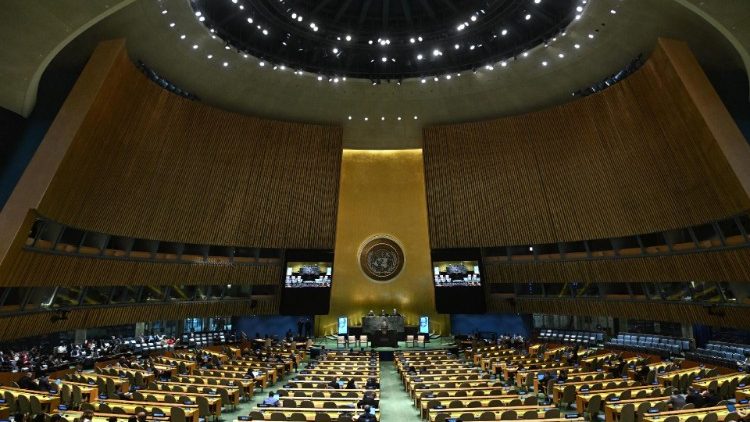‘Birth control is not the key to sustainable development’
As the U.N. marks the thirtieth anniversary of the Cairo International Conference on Population and Development (ICPD) this year, Archbishop Gabriele Caccia reiterates that promoting birth control policies does not help eradicate world poverty and promote sustainable development.
May 02, 2024

By Lisa Zengarini
Nearly thirty years have passed since the International Conference on Population and Development (ICPD) in Cairo, Egypt, which transformed the global approach to population and development issues, and defined a bold agenda for sustainable development.
The Cairo Programme of Action
The conference was held in the Egyptian capital from 5-13 September 1994 gathering some 20,000 delegates, and resulted in the adoption of a landmark Programme of Action (PoA), which affirmed that inclusive sustainable development is not possible without prioritizing human rights, and addressing inequalities as well as the needs, of individual women and men.
Its ambitious goals, included the eradication of extreme poverty and hunger, the achievement of universal primary education, the promotion of gender equality and empowerment of women, the reduction of child mortality, and the improvement of maternal health.
The UN 2030 Agenda
Since then, there have been significant advancements in development, notably with the adoption in 2015 of the U.N. Sustainable Development Goals (SDG), to eliminate poverty, achieve gender equality, and secure the health and well-being of all people. The 17 global goals, known as Agenda 2030, call for collective effort across a wide range of areas – including environmental action, public health, human rights, education, and much more – to usher in a new era of development around the world.
Eradication of poverty facing new challenges
Thirty years on, however, growing inequalities, prolonged crises and a retreat from multilateralism threaten the legacy of that landmark achievement, and progress is at risk of stagnation or even reversal.
“It is evident that numerous challenges persist, especially in the pursuit of the eradication of poverty”, noted Archbishop Gabriele Caccia the Holy See’s Permanent Observer to the United Nations on Wednesday.
Birth control and abortion don't help stem poverty
Speaking at an event organized in New York to mark the anniversary, the Vatican Observer lamented that over the past three decades, the implementation of the ICPD Programme of Action (PoA) has become “increasingly narrow in focus,” with a “consequent shift away from addressing development issues.”
Archbishop Caccia referred specifically to the ongoing emphasis given by the United Nations’ agencies to birth control policies, including abortion, as a means to stem poverty and promote development, which has been a contentious issue since the Cairo Conference.
“This is not just a harmful misunderstanding of the PoA, but of development in a wider sense”, he said. “It also leads to the erosion of respect for the sanctity of human life and the inalienable dignity of the human person.”
Population control is not the key to sustainable development
Concluding, Archbishop Caccia once again rejected the “notion that population control is the key to sustainable development.” Instead, he said “it is essential to guarantee that all men, women and children are afforded the opportunity to actualize their full potential.”
The Holy See has engaged extensively in United Nations negotiations on issues concerning sexual and reproductive health rights as they have emerged and evolved in a dynamic global agenda over the past three decades and has said that suggesting that reproductive health includes a right to abortion explicitly violates the language of the ICPD, and defies moral and legal standards.--Vatican News







Total Comments:0